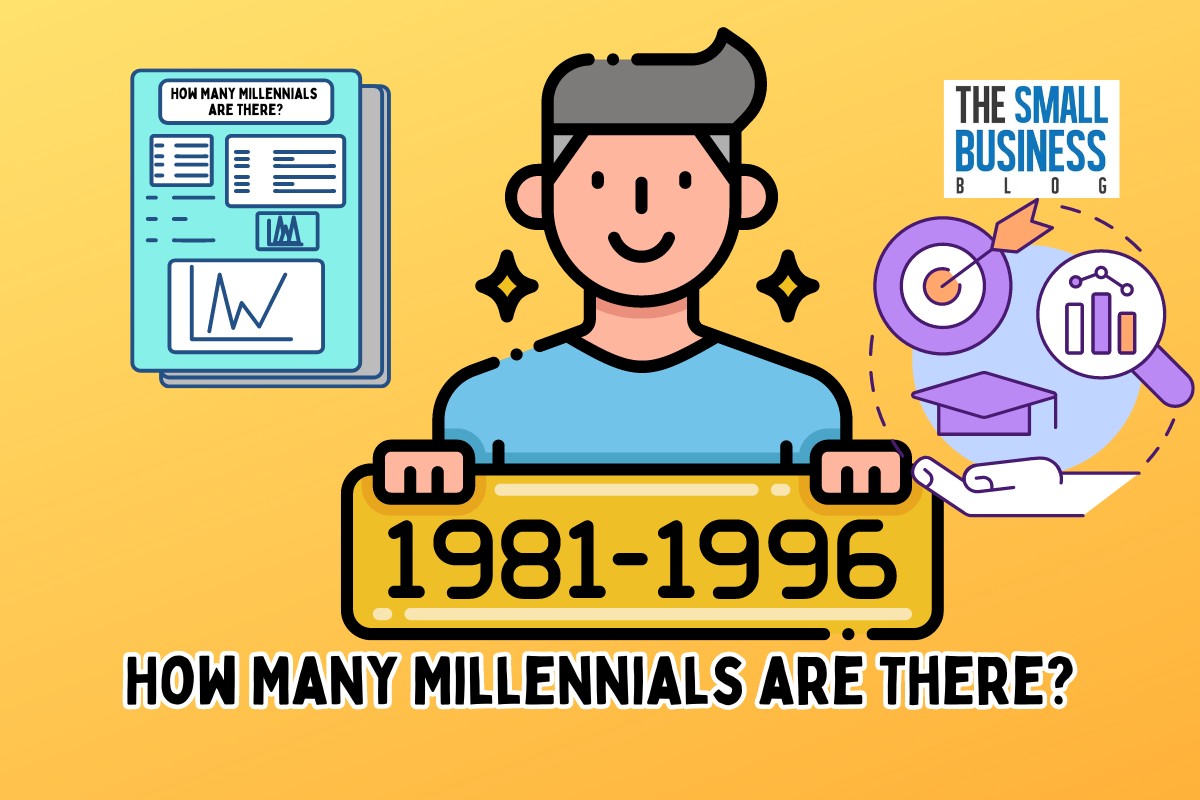Millennials are also called Gen Y or Generation Y and are the generation that came before Gen Z and after Gen X.
Millennials account for births between 1981 and 1996.
By the end of 2023, all Millennials will be between 27 and 42 years old.
How many Millennials are there in 2024?
Let’s dig into the realm of Gen Y and find out.
Post Contents
Key Statistics
- There are 1.8 billion Millennials in the world’s population (or 23%).
- Generation Y (Millennials) account for the largest adult global population.
- In the United States there are 72.2 million Millennials.
- Asia is home to about 25% of Millennials.
- There are 14.89 million Millennials in the United Kingdom.
- Millennials are considered the most educated of all generations.
- Generation Y has grown up with technology and are often called digital natives.
- 75% of Millennials engage with brands online.
- 73% of Millennials use their smartphones for shopping and buying.
How Many Millennials are There?

According to data, there are 72.2 million Millennials in the United States alone.
Globally, there are an estimated 1.8 million people in the Millennial generation demographic.
Generation Y, Millennials, make up the largest portion of the world’s adult population.
Asia has an estimated 25% of this age group born between 1981 and 1996.
Also, in the U.K., there are 14.89 million Millennials.
Millennials were given this title because the older of this generation became adults at the turn of the millennium.
(Statista, Twinkl, WEForum)
Regional Millennial Statistics
We have discussed some regional data regarding Millennials, but here are more for your consideration.
- Asia has 1.1 billion Millennials, which is over 24% of the population.
- Africa has 278 million Millennials which is around 21% of the population.
- The Caribbean and Latin America region has 155 million Millennials which is 23% of its population.
- Europe is home to 148 Millennials, which is 20% of the region’s population.
- North America has a population of 76 million Millennials which accounts for 21% of the region’s population.
- The Oceania region hosts 9 million Millennials, which is 22% of its population.
- While 40% of Millennials in China hold two-thirds of the nation’s passports, this generation has the biggest influence on the travel industry.
This data shows the significance of the Millennial generation across the globe.
(WEForum)
Millennials in the Workforce
Something that differentiates Millennials from the preceding generations is their willingness to job hop.
This is when you change jobs a lot.
In fact, Generation Y has a habit of doing this.
Generation Y members have also built a reputation for being the least engaged at work, which could contribute to their job-hopping.
One Gallup poll revealed that 21% of Generation Y (Millennials) claim they changed jobs within a 12-month period.
This is over three times the figure of those who are not Millennials.
Millennials are also known for being always open to new job opportunities and willing to switch jobs.
Gallup also reported that due to Millennial job turnover, it costs the United States economy $30.5 billion (USD) yearly.
(Gallup)
Millennial Lifestyle and Habits

Every generation has its own patterns, habits, and behaviors and this includes Millennials.
Let’s see what makes them different from past and present generations.
Digital Natives
Generation Y is the first generation to have grown up with the digital world.
They have always had internet access (most of them) and are mostly proficient on computers and other tech devices.
Highly Educated
Millennials are considered to be the most educated (so far) with roughly 40% of them having college degrees.
For reference, 25% of Boomers and 29% of Gen X have college degrees.
Healthy Lifestyle
A healthy lifestyle is another element of the Millennial generation.
Gen Y members are more serious about their health and the least apt to drink alcohol or smoke cigarettes.
This group is more apt to eat and drink more nutritional foods and exercise more than their predecessors.
Being digital natives, this generation is also the first to use digital fitness trackers.
Work
Millennials desire to have meaningful jobs, not just a career or job that earns big money.
They also prefer clear and concise communication at work and for collaborative projects.
Their preference for working at companies is that they share similar values like sustainable practices.
(Twinkl)
Millennial Shopping and Buying Behaviors

It’s important for marketers to know the buying behaviors of their target audience.
If your audience includes Millennials, here are some shopping and buying behaviors for you.
In 2023, 67% of Millennials are more apt to join up and engage with brand loyalty programs.
Moreover, 53% of them rely on these programs to make their buying decisions.
Millennials’ buying power is 86% less than for consumers in past generations.
Even with less buying power, 27% of Generation Y members said they plan to spend more on their luxury items when compared to other generations.
Data revealed that 48% (nearly half) of Millennials prefer to shop online than in the store.
Furthermore 78% of them think that a shopping site or app is the best way to maintain customer loyalty.
Is this a side effect of being digital natives?
31% of Millennials feel a brand needs to have at least a 3-star rating to get their attention.
57% of Millennial women say that social proof and brand reputation go hand-in-hand.
Also, this impacts their buying decisions.
The average Millennial male spends $5,000 on vacation, which shows a 35% spending power.
In terms of social media, 75% of the Millennial generation engage with brands and 63% claim social media ads drove them to buy something.
More data shows that 73% of Millennials shop via their smartphones, which makes sense since they are tech savvy.
This same percentage say that technology has a positive impact on their work-life balance.
By 2025, it’s expected that Millennial spending in the United States will see a rise of over 25%.
This is because they will be entering their “prime” spending years.
(Fit Small Business, ThriveMyWay, WEForum)
Conclusion
The sources we found revealed that Millennials account for the largest portion of adults in the world.
We know that they like to change jobs for new opportunities, believe in inclusion, and are mostly environmentally friendly.
FAQs
What are other names for Millennials?
Millennials are also referred to as Generation Y, Gen Y, Echo Boomers, or Digital Natives.
However, in the North American region, Millennials is the common phrase for this generation born between 1981 and 1996.
However, some research shows that the birth years vary and include those born between 1977 and 1995.
There is much speculation and confusion regarding this generation.
Are Millennials hard workers?
Millennials may show themselves to be job hoppers, but many of them have also shown they can and do stay at jobs longer.
Some prefer to build their careers and get into management and leadership positions.
Some get there faster than others because of how hard they work for it.
The stereotypical idea that Millennials all feel “entitled” simply isn’t true.
While some do think they should progress at work faster than they do, many are willing to work to get there.
Overall, Millennials are usually hard-working, loyal, problem-solving workers all over the globe.
What are the key characteristics of Gen Y?
Gen Y, or Millennials have five key characteristics every marketer should know.
Here are these characteristics:
1. They desire a good work-life balance.
2. Gen Y like work flexibility as they are themselves flexible at work.
3. Generation Y is tech-savvy digital natives.
4. Millennials are passionate and have a big entrepreneurial spirit.
5. Millennials believe in diversification and inclusion.
These are just the top five Millennial characteristics.
What are some challenges facing Millennials today?
According to Mindshift Wellness Center, Millennials face many challenges not faced by other generations.
Here are the top ten:
1. Unemployment or poor-paying jobs – Rising inflation means job loss and low pay for many Millennials.
2. Student loan debt – The most educated generation also is the generation with the most student loan debt.
3. Addiction to tech or devices – Because they have been exposed to technology most of their lives, they feel they can’t do without it.
4. Cancel culture – Some face issues with differing opinions and thoughts, causing a divide that isn’t conducive to unity.
5. Aging parents – Millennials say they are having to take on double duty in work to care for their aging parents like taking on a second job or side hustle.
6. Bullying and/or violence – Bullying, cyberbullying, and violence is part of the culture today.
7. Discrimination – This can include race, sex, sexual orientation, age, religion, or status.
8. Addictions like alcohol, drugs, and sex – With access to illicit drugs along with alcohol and a sex-oriented society, it’s easier to become addicted.
9. Mental health problems – Work or life stress results in more of this generation facing anxiety, depression, and other mental health issues.
10. Low human interaction – The idea of socializing with others isn’t in the wheelhouse of most Millennials who are wrapped up in their own work and lives.






























